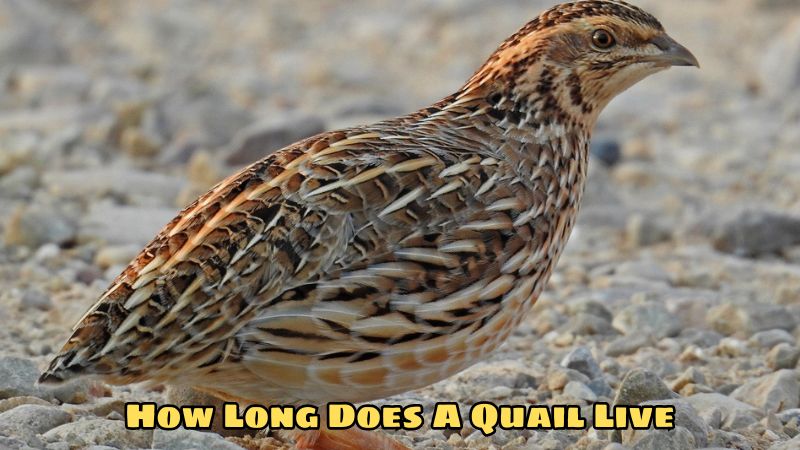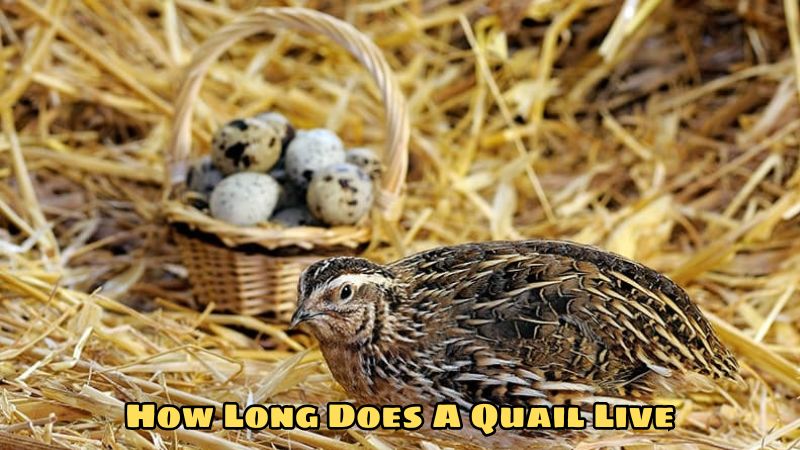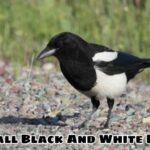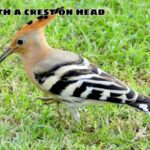Quail, with its small body and adorable appearance, is one of the birds that impresses people not only with its appearance but also with its usefulness in daily life. However, few people know that the lifespan of quail is quite short. This makes them a popular agricultural and domestic animal, cared for for meat and eggs. However, in the natural environment, quail often have a shorter lifespan, due to natural factors and predation from natural competitors.
Regardless of the environment, quail are still an indispensable part of the ecosystem and economy of many countries around the world. So let’s explore with Exoticbirdscorner in more detail how long does a quail live?
How long does a quail live?
Quail is a small bird, popular in many parts of the world, especially Asia. They are known for their small size, gray-brown fur and characteristic chirping sound. Quail often live in flocks, foraging in grasslands, bushes and agricultural areas.
Quail is not only loved for its lovely appearance but also for its high nutritional value. Quail meat is soft, sweet, rich in protein and essential vitamins and minerals for the body. Therefore, quail is commonly used in cuisine, processed into many delicious dishes such as grilled quail, braised quail, braised quail,…
Besides its nutritional value, quails are also raised for eggs. Quail eggs are small, have a mottled brown shell, and are more nutritious than chicken eggs. Quail eggs can be boiled, fried, cooked in soup or used as ingredients for many different dishes.
However, the lifespan of quails is still a mystery to many people. On average, farmed quail can live 2 to 3 years. However, in the natural environment, their lifespan can be shorter due to many factors such as hunting habits, diseases and living conditions.
So, how long can quail live in the wild? This is a question that scientists are still researching. What factors can their lifespan be affected by? Let’s learn more about this small but extremely important bird!

Lifespan of quail in natural environment
The longevity of quail in the natural environment is a topic that attracts the interest of many animal lovers. Unlike raised quails, the lifespan of wild quails depends on many complex factors, including habitat, food, enemies and diseases.
According to estimates, the average lifespan of quails in the wild ranges from 3 to 5 years. However, this number may change depending on the living conditions of each individual. For example, quail living in the wild, where there are many predators and food sources are scarce, generally have a shorter lifespan than quail living in protected environments or with abundant food sources.
In addition, the lifespan of quails can also be affected by factors such as illness, accidents and harsh weather conditions. Disease can leave quail weak and vulnerable to predators, while accidents and harsh weather conditions can cause direct injury or death.
Due to diverse influencing factors, accurately determining the lifespan of quail in the wild is a big challenge. Scientists are continuing to research to obtain more information on this topic, helping us better understand the life cycle of this small but vibrant bird.
Besides natural factors, human activities can also affect the lifespan of quail. Habitat destruction, pesticide use and indiscriminate hunting can threaten the survival of quail and reduce their lifespan. Therefore, protecting the environment and raising awareness of wildlife protection is the shared responsibility of each individual to contribute to maintaining ecological balance and protecting precious birds like quail.
Lifespan of quails in a raised environment
Unlike the harsh natural environment, the lifespan of quails in a nurturing environment can last up to 7-10 years, or even more. This is because humans create optimal living conditions, helping quails grow healthily and minimizing factors that affect their lifespan.
Good rearing conditions are the key for quails to live long
- Complete and nutritious food: Quails are provided with specialized animal feed, rich in protein, vitamins and minerals, ensuring to fully meet the body’s nutritional needs.
- Safe and hygienic environment: The barn is scientifically designed, ensuring ventilation and cleanliness, minimizing pathogens and harmful bacteria.
- Regular health care: Quails are fully vaccinated, regularly monitored for health and promptly treated when sick.
Application of advanced science and technology
At modern quail farms, the application of advanced science and technology such as automated systems for feeding, drinking, egg collection, temperature and humidity control,… helps improve quality. Care for and create the best conditions for quails to develop and prolong their lifespan.
Thanks to the above factors, farmed quails can live longer than wild quails. However, it should be noted that the lifespan of quails also depends on the breed of bird, care and management of the breeder. Therefore, choosing good bird breeds, applying advanced farming techniques and scientifically caring for quails will contribute to helping quails live healthy lives and prolong their lifespan.
Factors affecting the lifespan of quails
The lifespan of quails, whether in a captive environment or in the wild, is a journey filled with many mysteries and depends on many different factors.
Genetics plays an important role: Like humans, quails also possess genetic genes that determine health and longevity. Quails with good genetics and innate health will be able to resist disease better and live longer than individuals with weak genetics.
Health is the foundation: Healthy quails, less susceptible to diseases, will have a better chance of living longer. A good immune system helps quails fight against harmful agents from the outside environment, while a healthy body helps them have enough health to live, forage and maintain life.
Nutrition plays a key role: A complete, balanced diet provides quails with adequate vitamins, minerals and essential nutrients, helping quails grow well, increase resistance and longevity.
Safe living environment: A clean, airy, safe living environment, away from pollutants and pathogens helps quails stay healthy and minimize the risk of disease.
Attentive care: Attentive care of quails, regular health monitoring, full vaccination and timely treatment of diseases are important factors to help quails live healthy and prolong their lives.
Besides the above factors, the lifespan of quails can also be affected by other factors such as psychology, stress, accidents, etc. Therefore, creating a good living environment and providing food Proper nutrition and attentive care are the breeder’s responsibility to help quails have a healthy life and prolong their lifespan.
Compare the lifespan of quail with other birds
The lifespan of quails, compared to other birds, can be classified as average, equivalent to small birds such as sparrows, buntings, ringed birds,…
Specifically, quail raised in good conditions can live from 7 to 10 years, or even more. Meanwhile, wild quails are affected by many harsh environmental factors, so they have a shorter lifespan, only 3 to 5 years.
However, compared to large birds, quails have a significantly shorter lifespan. For example, eagles and falcons can live up to 30 years, even 50 years in natural conditions.
The reason for this difference is because large birds have larger body sizes, so the amount of food needed each day is also greater. This helps them store abundant energy, increase resistance and better cope with diseases, accidents and harsh environmental conditions.
Additionally, large birds often live in areas with fewer predators, so the risk of attack and death is lower. Thanks to these factors, large birds can live longer than small birds like quail.
In general, the lifespan of quail depends on many different factors such as genetics, health, nutrition, living environment and care. Creating good living conditions and attentive care will help quails have a healthy life and prolong their lifespan.
Epilogue
Quail, a small bird that brings a lot of value to humans, can live in captivity or in the wild, depending on the nutrition and living conditions provided. However, this depends on safety from dangers such as predators or natural factors such as weather and food scarcity. Regardless of the environment they live in, quail are an important part of the ecosystem and culture of many countries, playing an important role in farming and in the local economy.





